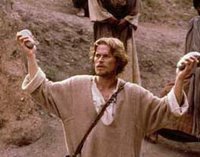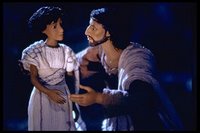Jesus' Humour in Bible Movies
The Comedy Jesus Films
An obvious place to start is comedies which feature Jesus as a character. However, in most of the obvious examples, Jesus is played straight, it's the antics around him where characters might be said to joke; or it's the fact that a non-joking Jesus is in an unusual context that provides the humour.
Take for example Luis Buñuel's The Milky Way (1969). Jesus appears a few times. The first time he is thinking of shaving his beard off. It's a funny scene, but the joke is about quirky juxtaposition. Moments later Jesus is running late – again, a normal element of being human that somehow feels at odds with how Jesus is traditionally portrayed
I covered 9 films that could be classed as comedic in my book, but most of them were based on the Hebrew Bible. Nevertheless only one of them was written in that style of humour where one of the characters provides humour by saying intentionally funny things (e.g. Jerry in Seinfeld or Chandler in Friends), Hal Hartley's The Book of Life (1998). Here the 'funny' character is Satan even though Jesus (who has come to judge the living and the dead) remains the 'hero', though much of the humour comes from the quirky and surreal world to which Jesus returns.
Indeed the existing comedy Bible movies are mostly written in that style where the characters themselves play things straight despite the fact they exist in a funny / absurd world / situation or they are the absurd ones. None of these films play Jesus as absurd, though I've not seen much of Black Jesus (2014-19) yet.
Perhaps the most obvious example of the absurd universe model is the most famous comedic Bible Film Monty Python's Life of Brian (1979). Here Jesus only appears briefly at the start delivering the Sermon on the Mount in traditional fashion. The humour comes from the absurd conversations that happen at the edges of the crowd and then as the film pans out further we discover Jesus may very well be the only sane character in the entire character.
The other film that might qualify as a comedy Jesus film is Get Some Money (2017) directed by Biko Nyongesa. The original short film of the same name was billed as a comedy about Judas' suicide. As someone not really familiar with a Kenyan sense of humour I found it difficult to relate to the humour – suicide tends not to be played for laughs in Anglo-American culture. Some bits were still amusing though again Jesus himself was not making jokes or wry observations.
Lastly there's Jesus of Montreal (1989) which, as it is often observed, is not really a Jesus film at all as much as a film about Jesus which leans heavily on allegory. Interestingly Daniel, the character in the film who is portraying Jesus in a play, does have a sense of humour, but that's no something that carries over to his performance of Jesus. So the Christ-figure is funny, but not the Jesus figure. Indeed many of the classic Christ-figure films give their hero a sense of humour, but I'm going to resist going off on that tangent.
In short, while several films are funny about Jesus, none of those really portray Jesus as having a sense of humour. However, there are several of the more traditional-style Jesus films which do give Jesus a sense of humour, so lets turn to them now.
Son of Man (1969)
Dennis Potter's play, Son of Man was groundbreaking in so many ways, but it was when Gareth Davies adapted it for the BBC that elements of Jesus' humour began to emerge. The actor Davies picked as his lead – Colin Blakely – gives an electric performance as Jesus and his version of the Sermon on the Mount is a particular highlight. There are a few changes to the script. I'm not sure whether Potter rewrote it for the television, or if that was down to Davies, or just the way Blakely delivered the scene. Perhaps a combination of the three, but it's there that a couple of little humorous interjections emerge. The potential is there in Potter's words, but Blakely injects the scene with the impression that not only does his Jesus realise humour is a useful tool, but that he is clearly revelling in using it. "It's easy to love those who love you" says Blakely with perfect comic timing "Why even the tax collector can do that". Later, he admits it would hurt were someone to strike you on the cheek and when Brian Blessed's Peter adds "Yes, especially if I were to do it Master!", Jesus roars with laughter along with everyone else. The signs of Jesus' sense of humour are brief, but very much there.
The Last Temptation of Christ (1988)
Scorsese's interpretation of the story was different in so many ways from its predecessors that it's hardly a surprise that humour is one of the elements of Jesus' humanity (though perhaps it's a divine characteristic too) which it draws out. In some ways this is surprising as Jesus tends to be very intense and serious in this movie. The first flicker of a sense of humour here occurs in the stoning scene. Jesus is challenging the crowd about their own sin. When Zebedee steps forward claiming he's not done anything wrong, Jesus asks him his mistresses' name. It's meant rhetorically, but when another member of the crowd shouts out "Judith", Jesus raises his eyebrow wryly. At a recent screening, which I introduced, the audience laughed at that moment.
Shortly afterwards the disciples arrive at the Wedding at Cana, which Nathaniel (whose cousin is getting married) is helping out with. When the wine runs out Jesus asks what is in the nearby jars. Nathaniel informs him that they're only water – he filled them himself. Jesus suggests he check anyway. Nathaniel is insistent, but eventually gives way, only to discover they are now filled with wine. Nathaniel stares back at Jesus open mouthed. Jesus – in what has become a much used meme, raises his glass with an told-you-so smile.
There's not much more to it than that, but certainly this was a development, and moreover it's perhaps the only moment in any Jesus production prior to The Chosen where I smile at Jesus' sense of humour.
The Visual Bible: Matthew (1994)
If Scorsese's introduction of a Jesus with a sense of humour was a bit of an innovation then Regardt van den Bergh's Matthew was a revolution. Bruce Marchiano received instruction from his director to play Jesus as a "Man of Joy" (p.72) and inspiration from an 8 year old friend who remarked "Well I sure hope he smiles a lot because Jesus in the other Jesus movies never smiled, and I know that Jesus smiles all the time". Marchiano certainly delivered on that guidance, giving the most joyful, smiley portrayal of Jesus imaginable. Even the passages where it's hard to image Jesus smiling, Marchiano keeps going, for example the 7 woes of Matt 23. He later reflected that "Jesus smiled bigger and laughed heartier than any human being who's ever walked the planet". While it occasionally rankles with an old curmudgeon like me, many have found it life-changing.
But smiling and laughing are not the same as "being funny" and here van den Bergh and Marchiano were limited by the former's decision to stick to a word for word adaptation of Matthew's text. Yet while Matthew is not the kind of witty text that will instantly have you in stitches, it's important to remember even the deliberate examples of wit we do have from that period do not seem particularly funny to us today.
In that context there are one or two moments of humour in Matthew that feel not out of place in that context and the film certainly tries to stress the point that this is meant to be humorous. The most memorable is when it comes to Matt 7:3-5 ("How can you say to your brother, ‘Let me take the speck out of your eye,’ when all the time there is a plank in your own eye?"). This bit of comic exaggeration often cited as an example of humour in the Bible and, as if to underline the point, Marchiano picks up a big piece of wood and holds it against his eye as he delivers the line. It's not the greatest piece of comic delivery, but it does, at least, make the point.
Jesus (1999)
Roger Young's miniseries tries, as much as any previous Jesus film, so show Jesus having a laugh. There's the moment when he and his disciples rush to a water point, desperate for a drink and he playfully splashes them with the water and another similar moment later on.
Perhaps the most memorable scene in this respect is when some street performers seek to get the crowd – which Jesus is part of – to dance. Jesus (played by a youthful Jeremy Sisto) is very keen and jumps right up. Thomas (of course!) is less entranced and so Jesus seeks to coax him out of his shell a bit. It plays as funny, but in real life I would hate it if someone tried this. Jesus! You don't need my compliance to validate your own joy at dancing.
Elsewhere Jesus' style of preaching is more open than in many films. When he preaches he doesn't just get the kind of questions we find in the Bible, also gets heckled, and his reaction is to laugh along. Jesus himself doesn't tell jokes in this film, but he certainly is shown to have a good sense of humour.
More recent productions
All of these examples are from the twentieth century. Are there any, more-recent examples? Casting my mind back, I remember Jesus being generally cheery and good natured in films such as The Miracle Maker (2000) and Risen (2016) and perhaps even a little self-depricating in such a way as to suggest he doesn't take himself too seriously. But neither contain laughter, humour or jokes. Meanwhile 2006's Color of the Cross, Son of God (2014), Killing Jesus (2015) and Last Days in the Desert (2016) probably reversed the general trend of getting Jesus to lighten up a bit from his earlier silver screen outings, and presented him as a more serious figure. Likewise other non-English language efforts such as Shanti Sandesham (2004), Jezile (Son of Man, 2006), Su re (2012) and The Savior (2014) also have a more serious-minded approach. There is are a couple of exceptions and like Son of Man (1969) above, both are from British television...
The Second Coming (2003)
In 2003 Christopher Ecclestone, the (then) future Doctor Who, starred as the son of God come back to earth as a working class Mancunian. Northern humour was very much part of the mix. In one scene as he speaks to a vast crown he reminds them of scientific breakthroughs with potentially apocalyptic consequences and asks "Do you think you're reading for that much power?...You lot?....You cheeky bastards!"
The line that most stays with me comes from the end of the first episode. I won't spoil it for those who haven't seen it (it's currently on the Internet Archive), but even twenty years after watching it I could remember the episode's final line. "Well, maybe two".
Second Coming is far from a conventional Jesus film, and it's notable that this was an ITV production rather than something from the BBC. This is very much a Jesus who jokes, even if he's arguably more intense than many of the others. Moreover this is a Jesus who jokes and uses humour, but doesn't really smile and laugh that much (and when he does it's slightly unnerving).
The Passion (2008)
The Passion first broadcast by the BBC in 2008 contains a few humorous notes in its very first scene. Jesus and the disciples are attempting to buy a donkey and its colt and when their business is done the seller realises who Jesus is. Jesus asks him what he's heard and when the seller mentions overthrowing the Romans Jesus replies "Does this look like an army...apart from John and James". Later Jesus uses sleight of hand to inject a bit of humour into "Give to Caesar what belongs to Caesar" and also to turn some of his questioners cynicism back onto them.
This is also a Jesus who smiles and laughs as well. But the series is also keen to show those around Jesus laughing at the things he says, or more to the point how he says it. When Jesus is told "the elders instruct us" he counters "and you must listen to what they say...just don't do what they do". As Jesus, Joseph Mawle's delivery is good hear, his relaxed delivery and timing make many lines that read straight in the Gospels become funny. That is also due to Frank Deasy's script which rephrases the words from the Gospels making them more lively and immediate.
Over to you
That's all of the best examples I can think of, having mulled over this for a week or so. Did I miss any? If so, let me know in the comments below.
Labels: BBC's The Passion, Comedy, Jesus (1999), Last Temptation of Christ, Son of Man (1969), Visual Bible - Matthew





































